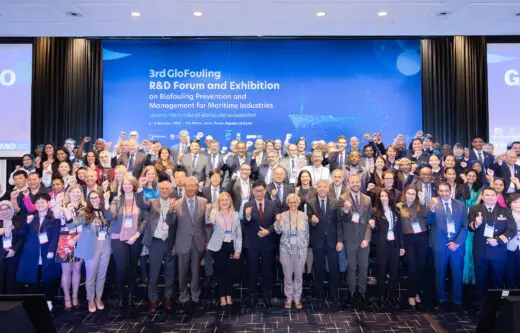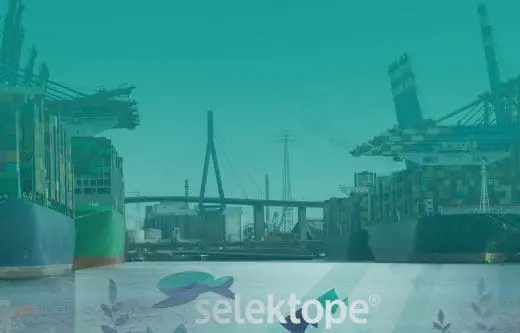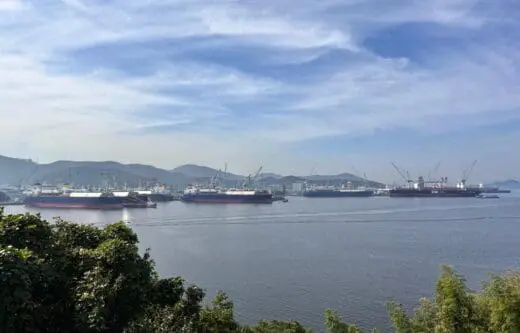Industry collaboration is key to keeping hulls clean
Biofouling prevention isn’t a new challenge. It is something that the operators of vessels have faced for hundreds of years. The bad news is that it’s a challenge that is not going away any time soon. In fact, with ocean temperatures rising on a global scale, marine biofouling risk will only increase further as global biofouling “hotspots” increase in size and severity. This means that vessels are increasingly at risk of the negative impacts of biofouling on ship efficiency and operating costs.
Today, marine antifouling coatings play a more important role than ever in shipping’s decarbonisation journey. Antifouling coatings provide the first line of defence against marine biofouling prevention on underwater surfaces. This remains to be the technology of choice for protection against unwanted marine visitors looking to set up home. Antifouling coatings have been used with great effect, their complex chemistry providing ways and means for active agents to leach out to prevent organisms from attaching, or through the use of slippery compounds that do not allow organisms to get a grip on the coated surface.
However, with intensifying biofouling pressures in the marine environment comes greater pressures on antifouling coatings to deliver continuous protection, regardless of varying levels of biofouling pressure that a vessel might encounter when trading. For large, ocean-going cargo ships this time period could be up to sixty months. This means that antifouling coating technology must continue to evolve to meet the changing needs of vessels now, and in the future.
Coating systems that make use of biocides are the most common type utilised today. However, the number of approved biocides available to paint manufacturers has significantly decreased during the past decade. Therefore, finding novel ways to utilise the current biocide toolkit available is a core component of the evolution of antifouling coatings. Collaborative R&D work between suppliers and between suppliers and antifouling coatings developers is key to this evolution. It’s a very exciting time to be in the biofouling prevention community.
When this community came together in late 2022, gathering at the inaugural International Antifouling Conference, they voiced the belief that collaboration between technology providers and their suppliers is key if the required evolution of antifouling coatings to meet the industry’s needs is to be realised. The conference marked the first time that the marine biofouling prevention community had gathered, in person, for four years.
Competitors in the commercial space, academia and end users agreed that working together to develop the best line of defence against biofouling is essential. They also agreed that the expansion of the antifouling toolbox to include emerging novel solutions is essential to ensuring that antifouling coating solutions offer the best protection in intensifying biofouling conditions.
The success of the inaugural conference put it on the map as one of the key platforms for anyone working in the field of marine biofouling prevention, particularly wet antifouling coatings, to meet and exchange ideas and insights into novel concepts.
As such, I-Tech and RISE (Research Institutes of Sweden) will bring over 170 of the best minds in the antifouling coatings industry, ship operators and academia together in Gothenburg, Sweden for the 2nd International Antifouling Conference this September to explore collaborative pathways and novel approaches towards marine biofouling prevention.
For I-Tech, our interest in organising and hosting this conference sparked from our belief that collaborative R&D efforts between biocide suppliers play a key role in supporting the optimisation of future antifouling coating technologies by providing proof of concept and initial R&D findings. We believe this can enable coating manufacturers to fast track product development and improve antifouling performance.
Our technology, Selektope, is added into marine paints to deter barnacle attachment to vessel hulls and niche areas. Therefore, evolving and enhancing the ways that our technology can be used in the coatings technologies developed by our customers across as many different potential application scenarios as possible is the only way forward.
To support this, our R&D team continues work across successful collaborative projects undertaken with fellow antifouling technology developers. In December 2022, we announced that our R&D team and the global specialty chemical company, LANXESS had successfully combined their respective antifouling technologies for the first time with promising results. Static tests of antifouling coating formulations containing Selektope and the SEA NINE™ family of biocides were conducted in multiple marine environments worldwide with differing biofouling risk. Positive results obtained have provided proof of concept. Additionally, a data pool of coating formulations has been developed that can be used by antifouling coating manufacturers to support the trialling of new combinations of existing, available biocides without the need to conduct initial R&D exploration activities.
Also, over the past five years, our R&D team and scientists from the Research Institutes of Sweden (RISE) have undertaken a series of projects to improve the use of Selektope in biocidal antifouling coatings, looking to the past for inspiration on what elements made antifouling coatings successful, or not.
In the past, superior antifouling efficacy was also achieved when a biocide was attached to a polymer chain with a covalent bond that was hydrolysable upon contact with water. This was the release mechanism that gave tributyltin (TBT)-containing coatings their success before the ban on the use of TBT came into force in 2008. Although the controlled release of Selektope in SPC coatings has been proved successful with multiple products commercialised and over one thousand vessels using Selektope-containing coatings to-date, researchers from I-Tech and RISE set out to develop a way of attaching Selektope to a co-polymer chain via the creation of Selektope-containing monomers that could be polymerised.
Static in-water tests confirmed the successful creation of a Selektope-containing monomer that was then polymerised to create the co-polymer chain with Selektope attached. This marked a significant achievement in the antifouling coatings sector as it expands the antifouling biocide toolbox. Proving this concept in silicone-based foul release coatings will be the next focus for I-Tech.
This is just one small corner of innovative, collaborative approaches underway in the field of antifouling coating chemistry that we are involved in. There are many more, many of which will be explored during in September at the International Antifouling Conference. Join us!
The International Antifouling Conference 2023 will be held on September 12-13 in the iconic Eriksberg shipyard area in Gothenburg, Sweden. The conference is sponsored by Stena Bulk, Stena Teknik and LANXESS. The charity partner for the conference in Mercy Ships and the esteemed media partner for the conference is the Royal Institution of Naval Architects (RINA).
Related articles

Innovative Solutions and Global Collaboration: Highlights from the 3rd GloFouling R&D Forum in Busan

Take aways from IMarEST Biosecurity Symposium 2024

Navigating innovation for smooth sailing: A recap of SMM 2024
